Examining Legal, Institutional, and Political Aspects of Presidency
VerifiedAdded on 2023/06/11
|10
|3058
|263
Essay
AI Summary
This essay provides a comprehensive analysis of the US presidency, examining it through various lenses, including legal, institutional, political, and psychological approaches. It discusses the advantages and disadvantages of each approach, highlighting how each perspective contributes to understanding the powers and limitations of the presidential role. The essay also delves into Woodrow Wilson's "politics/administration dichotomy," weighing its pros and cons in modern governance. Furthermore, it explores Barbara Sinclair's argument regarding the increasingly "unorthodox law-making" in Congress, detailing the shifts in legislative processes. Finally, the essay assesses the legitimacy of criticisms against President Obama, who was accused of exceeding his executive authority, by analyzing specific actions and comparing them to historical precedents. This document is available on Desklib, a platform offering a variety of study tools and solved assignments for students.
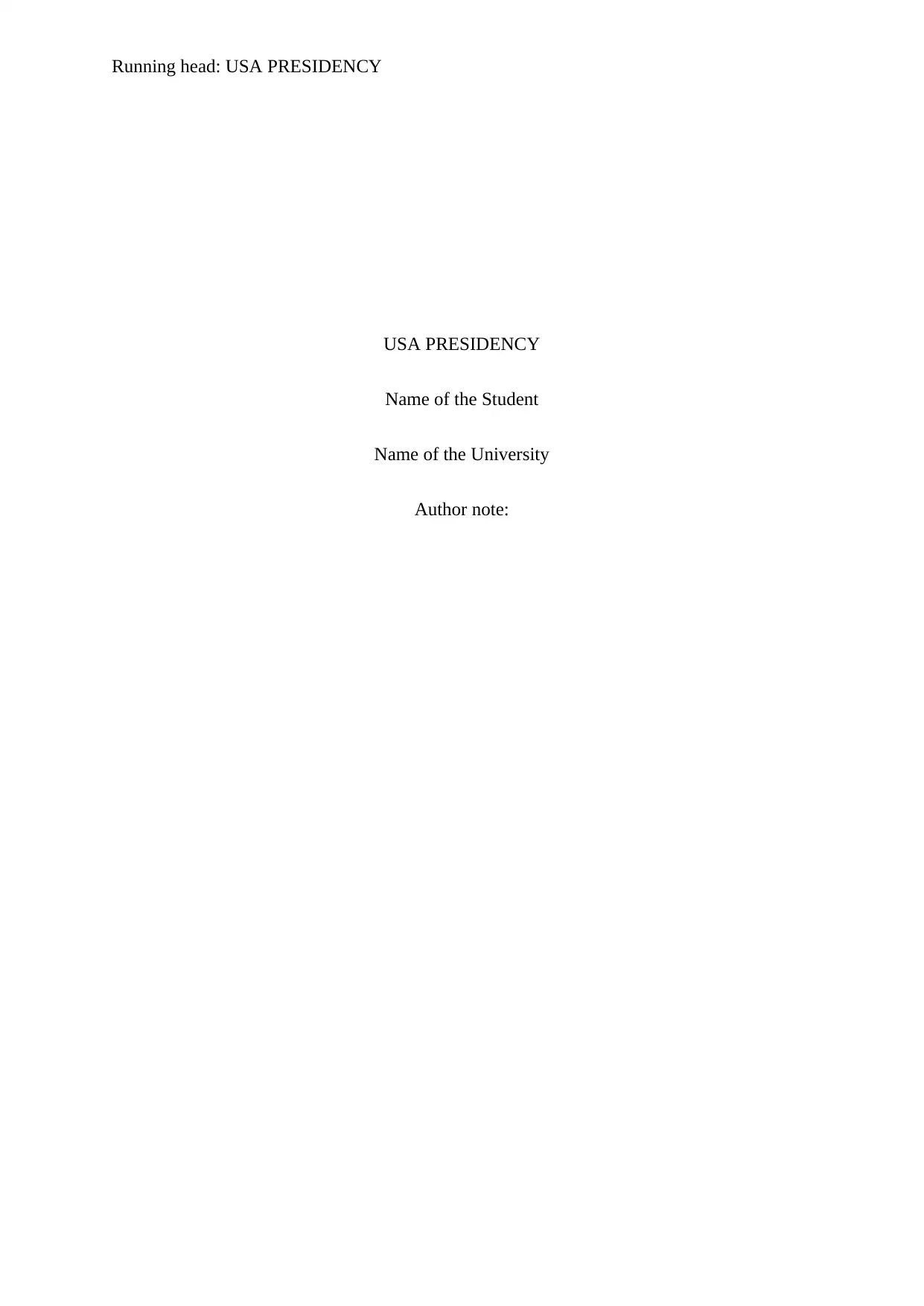
Running head: USA PRESIDENCY
USA PRESIDENCY
Name of the Student
Name of the University
Author note:
USA PRESIDENCY
Name of the Student
Name of the University
Author note:
Paraphrase This Document
Need a fresh take? Get an instant paraphrase of this document with our AI Paraphraser
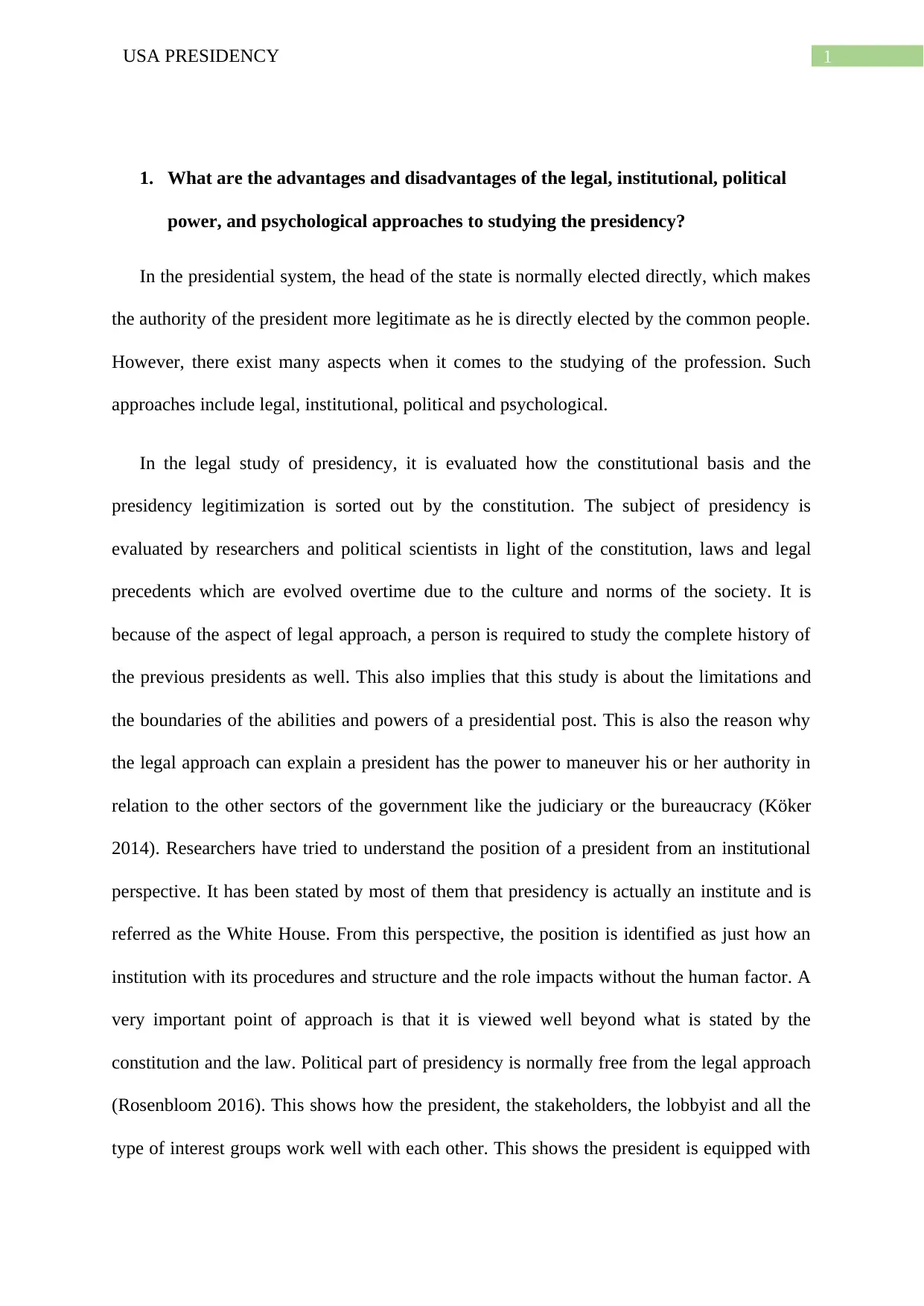
1USA PRESIDENCY
1. What are the advantages and disadvantages of the legal, institutional, political
power, and psychological approaches to studying the presidency?
In the presidential system, the head of the state is normally elected directly, which makes
the authority of the president more legitimate as he is directly elected by the common people.
However, there exist many aspects when it comes to the studying of the profession. Such
approaches include legal, institutional, political and psychological.
In the legal study of presidency, it is evaluated how the constitutional basis and the
presidency legitimization is sorted out by the constitution. The subject of presidency is
evaluated by researchers and political scientists in light of the constitution, laws and legal
precedents which are evolved overtime due to the culture and norms of the society. It is
because of the aspect of legal approach, a person is required to study the complete history of
the previous presidents as well. This also implies that this study is about the limitations and
the boundaries of the abilities and powers of a presidential post. This is also the reason why
the legal approach can explain a president has the power to maneuver his or her authority in
relation to the other sectors of the government like the judiciary or the bureaucracy (Köker
2014). Researchers have tried to understand the position of a president from an institutional
perspective. It has been stated by most of them that presidency is actually an institute and is
referred as the White House. From this perspective, the position is identified as just how an
institution with its procedures and structure and the role impacts without the human factor. A
very important point of approach is that it is viewed well beyond what is stated by the
constitution and the law. Political part of presidency is normally free from the legal approach
(Rosenbloom 2016). This shows how the president, the stakeholders, the lobbyist and all the
type of interest groups work well with each other. This shows the president is equipped with
1. What are the advantages and disadvantages of the legal, institutional, political
power, and psychological approaches to studying the presidency?
In the presidential system, the head of the state is normally elected directly, which makes
the authority of the president more legitimate as he is directly elected by the common people.
However, there exist many aspects when it comes to the studying of the profession. Such
approaches include legal, institutional, political and psychological.
In the legal study of presidency, it is evaluated how the constitutional basis and the
presidency legitimization is sorted out by the constitution. The subject of presidency is
evaluated by researchers and political scientists in light of the constitution, laws and legal
precedents which are evolved overtime due to the culture and norms of the society. It is
because of the aspect of legal approach, a person is required to study the complete history of
the previous presidents as well. This also implies that this study is about the limitations and
the boundaries of the abilities and powers of a presidential post. This is also the reason why
the legal approach can explain a president has the power to maneuver his or her authority in
relation to the other sectors of the government like the judiciary or the bureaucracy (Köker
2014). Researchers have tried to understand the position of a president from an institutional
perspective. It has been stated by most of them that presidency is actually an institute and is
referred as the White House. From this perspective, the position is identified as just how an
institution with its procedures and structure and the role impacts without the human factor. A
very important point of approach is that it is viewed well beyond what is stated by the
constitution and the law. Political part of presidency is normally free from the legal approach
(Rosenbloom 2016). This shows how the president, the stakeholders, the lobbyist and all the
type of interest groups work well with each other. This shows the president is equipped with
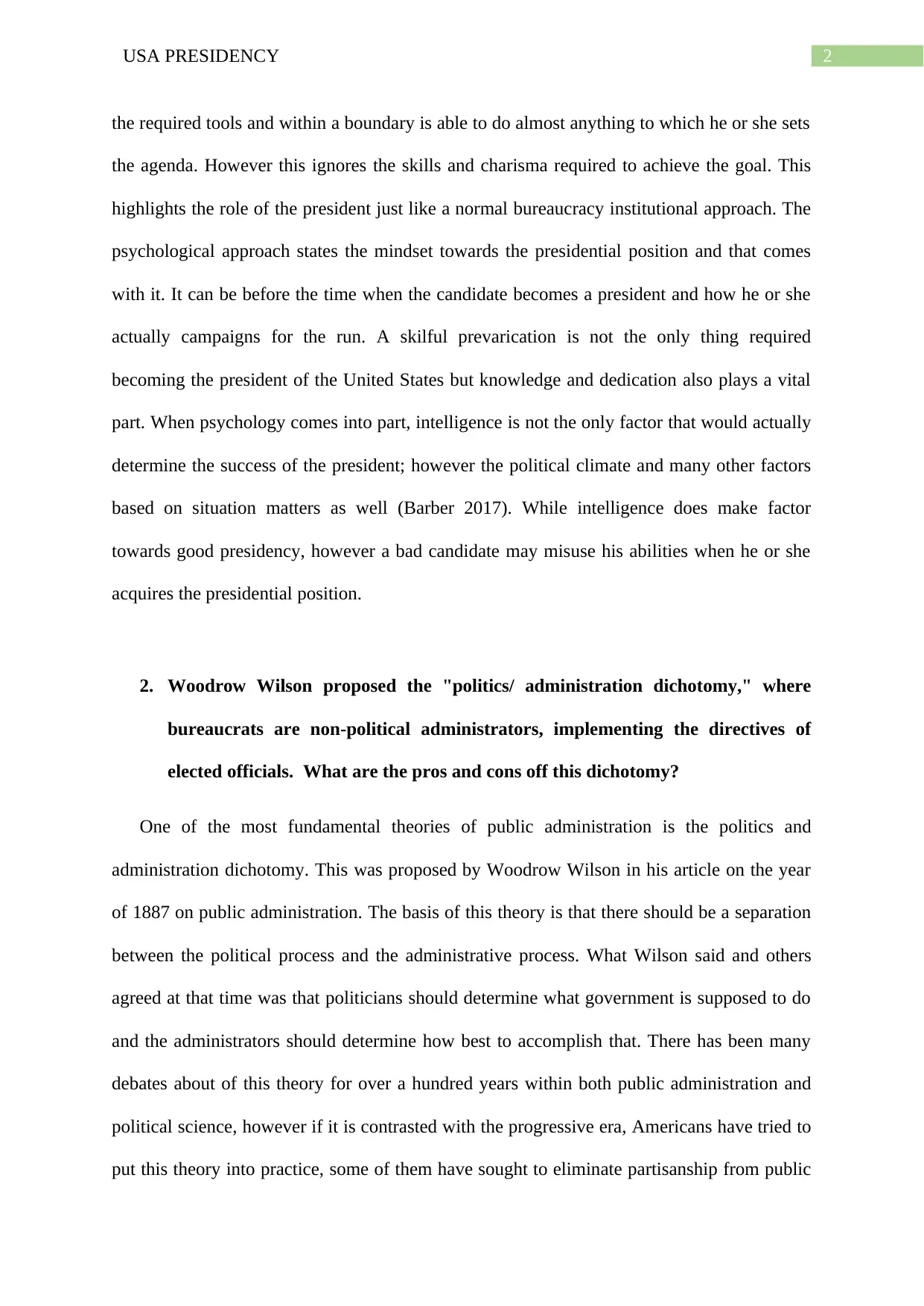
2USA PRESIDENCY
the required tools and within a boundary is able to do almost anything to which he or she sets
the agenda. However this ignores the skills and charisma required to achieve the goal. This
highlights the role of the president just like a normal bureaucracy institutional approach. The
psychological approach states the mindset towards the presidential position and that comes
with it. It can be before the time when the candidate becomes a president and how he or she
actually campaigns for the run. A skilful prevarication is not the only thing required
becoming the president of the United States but knowledge and dedication also plays a vital
part. When psychology comes into part, intelligence is not the only factor that would actually
determine the success of the president; however the political climate and many other factors
based on situation matters as well (Barber 2017). While intelligence does make factor
towards good presidency, however a bad candidate may misuse his abilities when he or she
acquires the presidential position.
2. Woodrow Wilson proposed the "politics/ administration dichotomy," where
bureaucrats are non-political administrators, implementing the directives of
elected officials. What are the pros and cons off this dichotomy?
One of the most fundamental theories of public administration is the politics and
administration dichotomy. This was proposed by Woodrow Wilson in his article on the year
of 1887 on public administration. The basis of this theory is that there should be a separation
between the political process and the administrative process. What Wilson said and others
agreed at that time was that politicians should determine what government is supposed to do
and the administrators should determine how best to accomplish that. There has been many
debates about of this theory for over a hundred years within both public administration and
political science, however if it is contrasted with the progressive era, Americans have tried to
put this theory into practice, some of them have sought to eliminate partisanship from public
the required tools and within a boundary is able to do almost anything to which he or she sets
the agenda. However this ignores the skills and charisma required to achieve the goal. This
highlights the role of the president just like a normal bureaucracy institutional approach. The
psychological approach states the mindset towards the presidential position and that comes
with it. It can be before the time when the candidate becomes a president and how he or she
actually campaigns for the run. A skilful prevarication is not the only thing required
becoming the president of the United States but knowledge and dedication also plays a vital
part. When psychology comes into part, intelligence is not the only factor that would actually
determine the success of the president; however the political climate and many other factors
based on situation matters as well (Barber 2017). While intelligence does make factor
towards good presidency, however a bad candidate may misuse his abilities when he or she
acquires the presidential position.
2. Woodrow Wilson proposed the "politics/ administration dichotomy," where
bureaucrats are non-political administrators, implementing the directives of
elected officials. What are the pros and cons off this dichotomy?
One of the most fundamental theories of public administration is the politics and
administration dichotomy. This was proposed by Woodrow Wilson in his article on the year
of 1887 on public administration. The basis of this theory is that there should be a separation
between the political process and the administrative process. What Wilson said and others
agreed at that time was that politicians should determine what government is supposed to do
and the administrators should determine how best to accomplish that. There has been many
debates about of this theory for over a hundred years within both public administration and
political science, however if it is contrasted with the progressive era, Americans have tried to
put this theory into practice, some of them have sought to eliminate partisanship from public
⊘ This is a preview!⊘
Do you want full access?
Subscribe today to unlock all pages.

Trusted by 1+ million students worldwide
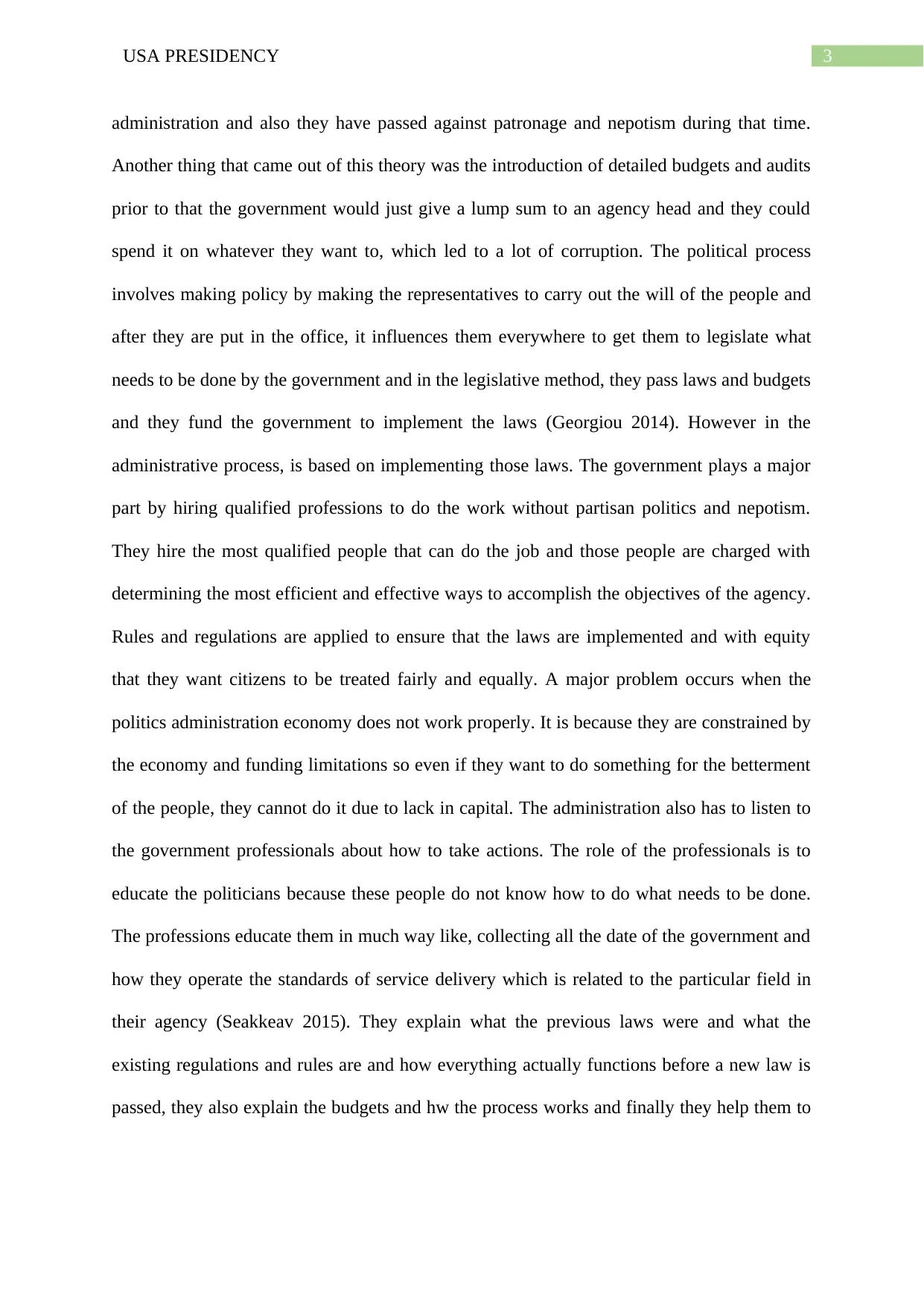
3USA PRESIDENCY
administration and also they have passed against patronage and nepotism during that time.
Another thing that came out of this theory was the introduction of detailed budgets and audits
prior to that the government would just give a lump sum to an agency head and they could
spend it on whatever they want to, which led to a lot of corruption. The political process
involves making policy by making the representatives to carry out the will of the people and
after they are put in the office, it influences them everywhere to get them to legislate what
needs to be done by the government and in the legislative method, they pass laws and budgets
and they fund the government to implement the laws (Georgiou 2014). However in the
administrative process, is based on implementing those laws. The government plays a major
part by hiring qualified professions to do the work without partisan politics and nepotism.
They hire the most qualified people that can do the job and those people are charged with
determining the most efficient and effective ways to accomplish the objectives of the agency.
Rules and regulations are applied to ensure that the laws are implemented and with equity
that they want citizens to be treated fairly and equally. A major problem occurs when the
politics administration economy does not work properly. It is because they are constrained by
the economy and funding limitations so even if they want to do something for the betterment
of the people, they cannot do it due to lack in capital. The administration also has to listen to
the government professionals about how to take actions. The role of the professionals is to
educate the politicians because these people do not know how to do what needs to be done.
The professions educate them in much way like, collecting all the date of the government and
how they operate the standards of service delivery which is related to the particular field in
their agency (Seakkeav 2015). They explain what the previous laws were and what the
existing regulations and rules are and how everything actually functions before a new law is
passed, they also explain the budgets and hw the process works and finally they help them to
administration and also they have passed against patronage and nepotism during that time.
Another thing that came out of this theory was the introduction of detailed budgets and audits
prior to that the government would just give a lump sum to an agency head and they could
spend it on whatever they want to, which led to a lot of corruption. The political process
involves making policy by making the representatives to carry out the will of the people and
after they are put in the office, it influences them everywhere to get them to legislate what
needs to be done by the government and in the legislative method, they pass laws and budgets
and they fund the government to implement the laws (Georgiou 2014). However in the
administrative process, is based on implementing those laws. The government plays a major
part by hiring qualified professions to do the work without partisan politics and nepotism.
They hire the most qualified people that can do the job and those people are charged with
determining the most efficient and effective ways to accomplish the objectives of the agency.
Rules and regulations are applied to ensure that the laws are implemented and with equity
that they want citizens to be treated fairly and equally. A major problem occurs when the
politics administration economy does not work properly. It is because they are constrained by
the economy and funding limitations so even if they want to do something for the betterment
of the people, they cannot do it due to lack in capital. The administration also has to listen to
the government professionals about how to take actions. The role of the professionals is to
educate the politicians because these people do not know how to do what needs to be done.
The professions educate them in much way like, collecting all the date of the government and
how they operate the standards of service delivery which is related to the particular field in
their agency (Seakkeav 2015). They explain what the previous laws were and what the
existing regulations and rules are and how everything actually functions before a new law is
passed, they also explain the budgets and hw the process works and finally they help them to
Paraphrase This Document
Need a fresh take? Get an instant paraphrase of this document with our AI Paraphraser
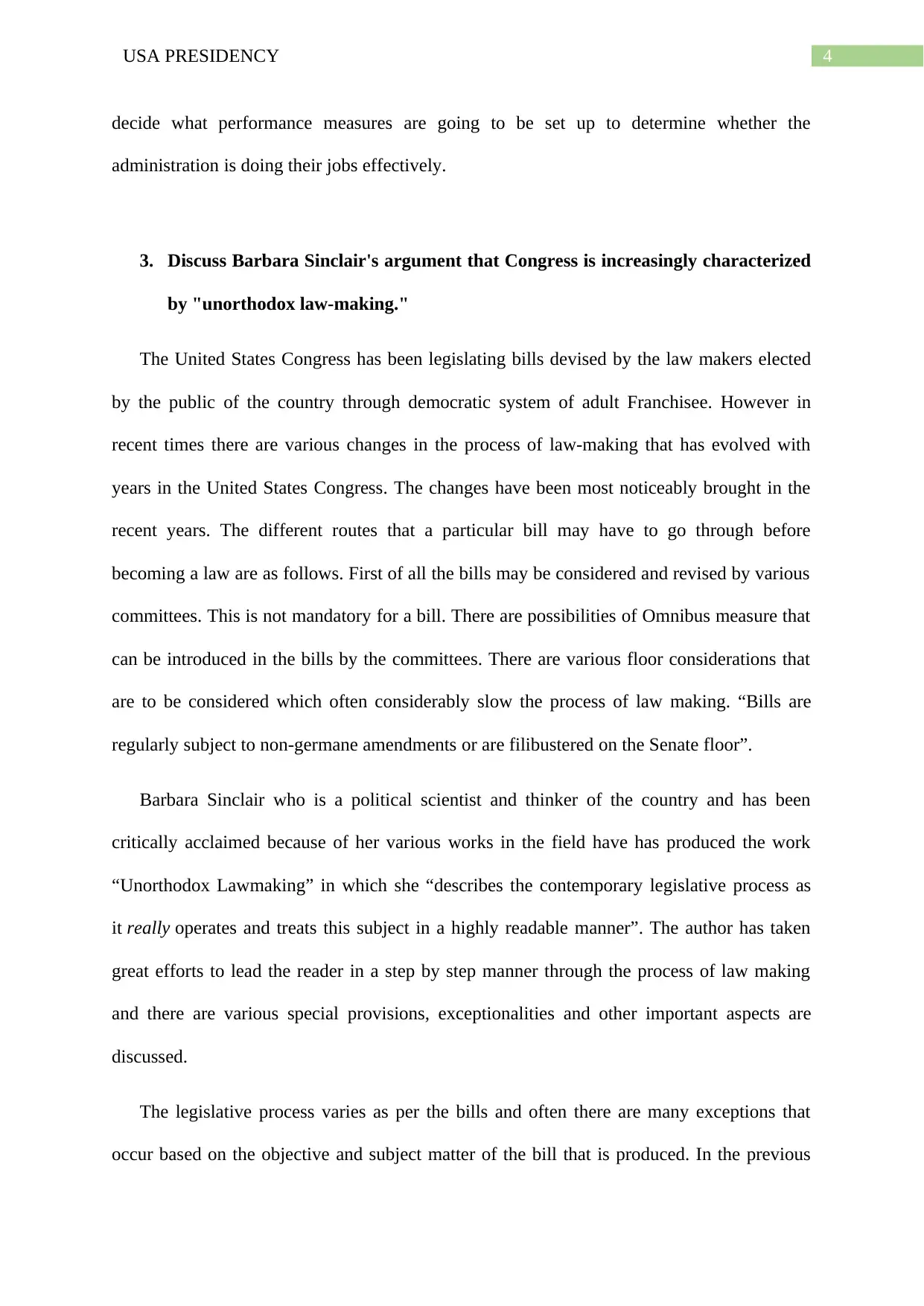
4USA PRESIDENCY
decide what performance measures are going to be set up to determine whether the
administration is doing their jobs effectively.
3. Discuss Barbara Sinclair's argument that Congress is increasingly characterized
by "unorthodox law-making."
The United States Congress has been legislating bills devised by the law makers elected
by the public of the country through democratic system of adult Franchisee. However in
recent times there are various changes in the process of law-making that has evolved with
years in the United States Congress. The changes have been most noticeably brought in the
recent years. The different routes that a particular bill may have to go through before
becoming a law are as follows. First of all the bills may be considered and revised by various
committees. This is not mandatory for a bill. There are possibilities of Omnibus measure that
can be introduced in the bills by the committees. There are various floor considerations that
are to be considered which often considerably slow the process of law making. “Bills are
regularly subject to non-germane amendments or are filibustered on the Senate floor”.
Barbara Sinclair who is a political scientist and thinker of the country and has been
critically acclaimed because of her various works in the field have has produced the work
“Unorthodox Lawmaking” in which she “describes the contemporary legislative process as
it really operates and treats this subject in a highly readable manner”. The author has taken
great efforts to lead the reader in a step by step manner through the process of law making
and there are various special provisions, exceptionalities and other important aspects are
discussed.
The legislative process varies as per the bills and often there are many exceptions that
occur based on the objective and subject matter of the bill that is produced. In the previous
decide what performance measures are going to be set up to determine whether the
administration is doing their jobs effectively.
3. Discuss Barbara Sinclair's argument that Congress is increasingly characterized
by "unorthodox law-making."
The United States Congress has been legislating bills devised by the law makers elected
by the public of the country through democratic system of adult Franchisee. However in
recent times there are various changes in the process of law-making that has evolved with
years in the United States Congress. The changes have been most noticeably brought in the
recent years. The different routes that a particular bill may have to go through before
becoming a law are as follows. First of all the bills may be considered and revised by various
committees. This is not mandatory for a bill. There are possibilities of Omnibus measure that
can be introduced in the bills by the committees. There are various floor considerations that
are to be considered which often considerably slow the process of law making. “Bills are
regularly subject to non-germane amendments or are filibustered on the Senate floor”.
Barbara Sinclair who is a political scientist and thinker of the country and has been
critically acclaimed because of her various works in the field have has produced the work
“Unorthodox Lawmaking” in which she “describes the contemporary legislative process as
it really operates and treats this subject in a highly readable manner”. The author has taken
great efforts to lead the reader in a step by step manner through the process of law making
and there are various special provisions, exceptionalities and other important aspects are
discussed.
The legislative process varies as per the bills and often there are many exceptions that
occur based on the objective and subject matter of the bill that is produced. In the previous
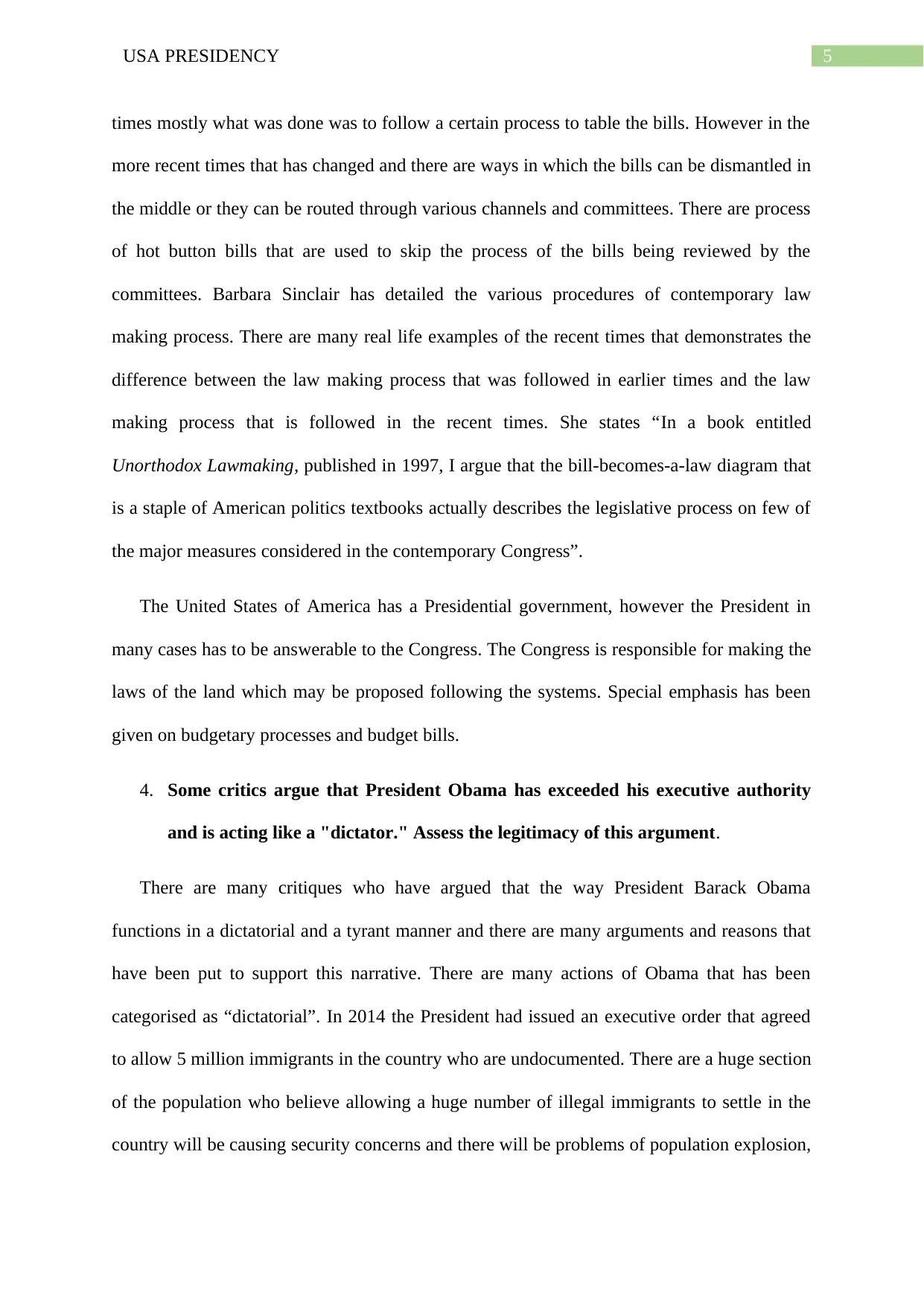
5USA PRESIDENCY
times mostly what was done was to follow a certain process to table the bills. However in the
more recent times that has changed and there are ways in which the bills can be dismantled in
the middle or they can be routed through various channels and committees. There are process
of hot button bills that are used to skip the process of the bills being reviewed by the
committees. Barbara Sinclair has detailed the various procedures of contemporary law
making process. There are many real life examples of the recent times that demonstrates the
difference between the law making process that was followed in earlier times and the law
making process that is followed in the recent times. She states “In a book entitled
Unorthodox Lawmaking, published in 1997, I argue that the bill-becomes-a-law diagram that
is a staple of American politics textbooks actually describes the legislative process on few of
the major measures considered in the contemporary Congress”.
The United States of America has a Presidential government, however the President in
many cases has to be answerable to the Congress. The Congress is responsible for making the
laws of the land which may be proposed following the systems. Special emphasis has been
given on budgetary processes and budget bills.
4. Some critics argue that President Obama has exceeded his executive authority
and is acting like a "dictator." Assess the legitimacy of this argument.
There are many critiques who have argued that the way President Barack Obama
functions in a dictatorial and a tyrant manner and there are many arguments and reasons that
have been put to support this narrative. There are many actions of Obama that has been
categorised as “dictatorial”. In 2014 the President had issued an executive order that agreed
to allow 5 million immigrants in the country who are undocumented. There are a huge section
of the population who believe allowing a huge number of illegal immigrants to settle in the
country will be causing security concerns and there will be problems of population explosion,
times mostly what was done was to follow a certain process to table the bills. However in the
more recent times that has changed and there are ways in which the bills can be dismantled in
the middle or they can be routed through various channels and committees. There are process
of hot button bills that are used to skip the process of the bills being reviewed by the
committees. Barbara Sinclair has detailed the various procedures of contemporary law
making process. There are many real life examples of the recent times that demonstrates the
difference between the law making process that was followed in earlier times and the law
making process that is followed in the recent times. She states “In a book entitled
Unorthodox Lawmaking, published in 1997, I argue that the bill-becomes-a-law diagram that
is a staple of American politics textbooks actually describes the legislative process on few of
the major measures considered in the contemporary Congress”.
The United States of America has a Presidential government, however the President in
many cases has to be answerable to the Congress. The Congress is responsible for making the
laws of the land which may be proposed following the systems. Special emphasis has been
given on budgetary processes and budget bills.
4. Some critics argue that President Obama has exceeded his executive authority
and is acting like a "dictator." Assess the legitimacy of this argument.
There are many critiques who have argued that the way President Barack Obama
functions in a dictatorial and a tyrant manner and there are many arguments and reasons that
have been put to support this narrative. There are many actions of Obama that has been
categorised as “dictatorial”. In 2014 the President had issued an executive order that agreed
to allow 5 million immigrants in the country who are undocumented. There are a huge section
of the population who believe allowing a huge number of illegal immigrants to settle in the
country will be causing security concerns and there will be problems of population explosion,
⊘ This is a preview!⊘
Do you want full access?
Subscribe today to unlock all pages.

Trusted by 1+ million students worldwide
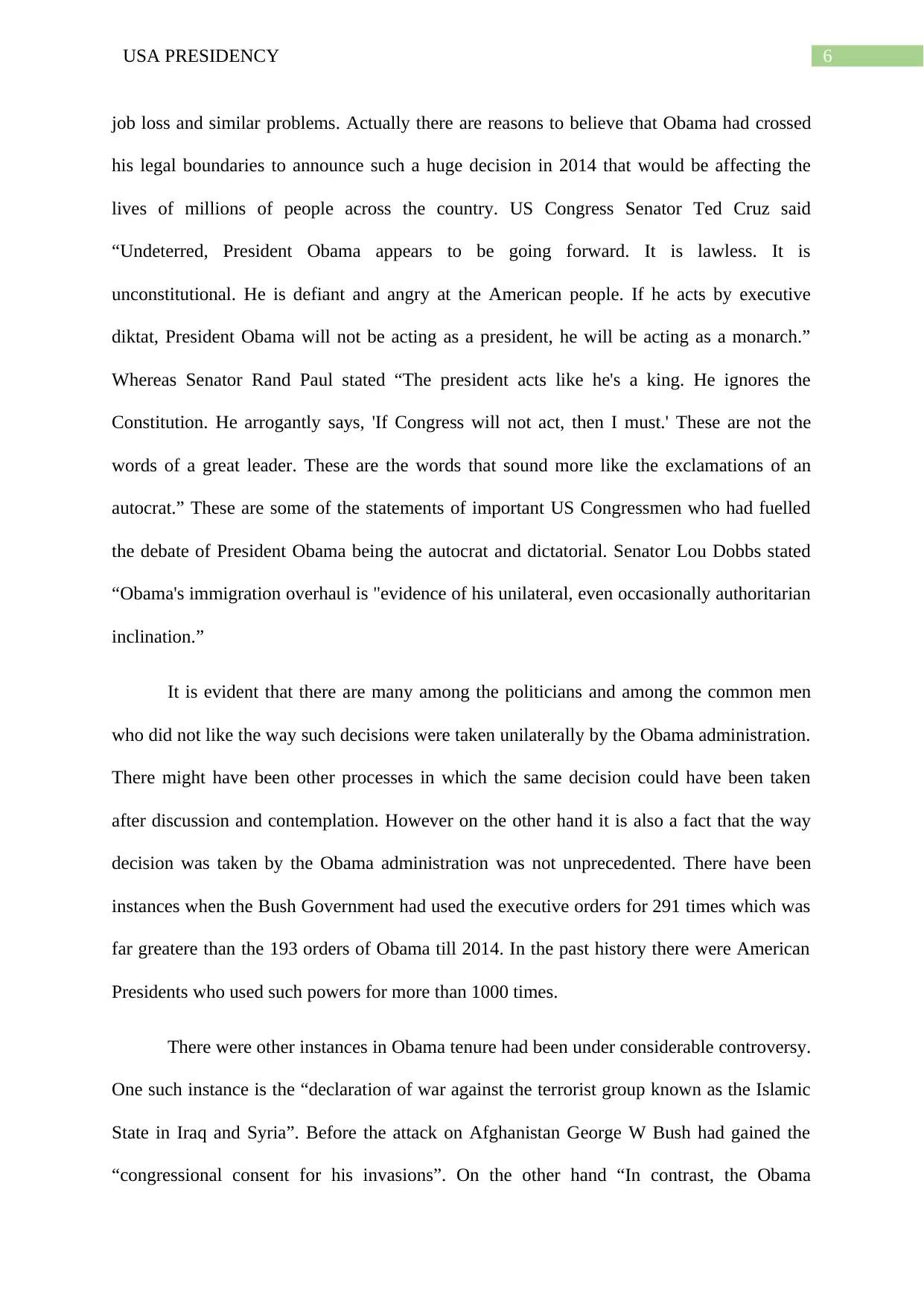
6USA PRESIDENCY
job loss and similar problems. Actually there are reasons to believe that Obama had crossed
his legal boundaries to announce such a huge decision in 2014 that would be affecting the
lives of millions of people across the country. US Congress Senator Ted Cruz said
“Undeterred, President Obama appears to be going forward. It is lawless. It is
unconstitutional. He is defiant and angry at the American people. If he acts by executive
diktat, President Obama will not be acting as a president, he will be acting as a monarch.”
Whereas Senator Rand Paul stated “The president acts like he's a king. He ignores the
Constitution. He arrogantly says, 'If Congress will not act, then I must.' These are not the
words of a great leader. These are the words that sound more like the exclamations of an
autocrat.” These are some of the statements of important US Congressmen who had fuelled
the debate of President Obama being the autocrat and dictatorial. Senator Lou Dobbs stated
“Obama's immigration overhaul is "evidence of his unilateral, even occasionally authoritarian
inclination.”
It is evident that there are many among the politicians and among the common men
who did not like the way such decisions were taken unilaterally by the Obama administration.
There might have been other processes in which the same decision could have been taken
after discussion and contemplation. However on the other hand it is also a fact that the way
decision was taken by the Obama administration was not unprecedented. There have been
instances when the Bush Government had used the executive orders for 291 times which was
far greatere than the 193 orders of Obama till 2014. In the past history there were American
Presidents who used such powers for more than 1000 times.
There were other instances in Obama tenure had been under considerable controversy.
One such instance is the “declaration of war against the terrorist group known as the Islamic
State in Iraq and Syria”. Before the attack on Afghanistan George W Bush had gained the
“congressional consent for his invasions”. On the other hand “In contrast, the Obama
job loss and similar problems. Actually there are reasons to believe that Obama had crossed
his legal boundaries to announce such a huge decision in 2014 that would be affecting the
lives of millions of people across the country. US Congress Senator Ted Cruz said
“Undeterred, President Obama appears to be going forward. It is lawless. It is
unconstitutional. He is defiant and angry at the American people. If he acts by executive
diktat, President Obama will not be acting as a president, he will be acting as a monarch.”
Whereas Senator Rand Paul stated “The president acts like he's a king. He ignores the
Constitution. He arrogantly says, 'If Congress will not act, then I must.' These are not the
words of a great leader. These are the words that sound more like the exclamations of an
autocrat.” These are some of the statements of important US Congressmen who had fuelled
the debate of President Obama being the autocrat and dictatorial. Senator Lou Dobbs stated
“Obama's immigration overhaul is "evidence of his unilateral, even occasionally authoritarian
inclination.”
It is evident that there are many among the politicians and among the common men
who did not like the way such decisions were taken unilaterally by the Obama administration.
There might have been other processes in which the same decision could have been taken
after discussion and contemplation. However on the other hand it is also a fact that the way
decision was taken by the Obama administration was not unprecedented. There have been
instances when the Bush Government had used the executive orders for 291 times which was
far greatere than the 193 orders of Obama till 2014. In the past history there were American
Presidents who used such powers for more than 1000 times.
There were other instances in Obama tenure had been under considerable controversy.
One such instance is the “declaration of war against the terrorist group known as the Islamic
State in Iraq and Syria”. Before the attack on Afghanistan George W Bush had gained the
“congressional consent for his invasions”. On the other hand “In contrast, the Obama
Paraphrase This Document
Need a fresh take? Get an instant paraphrase of this document with our AI Paraphraser
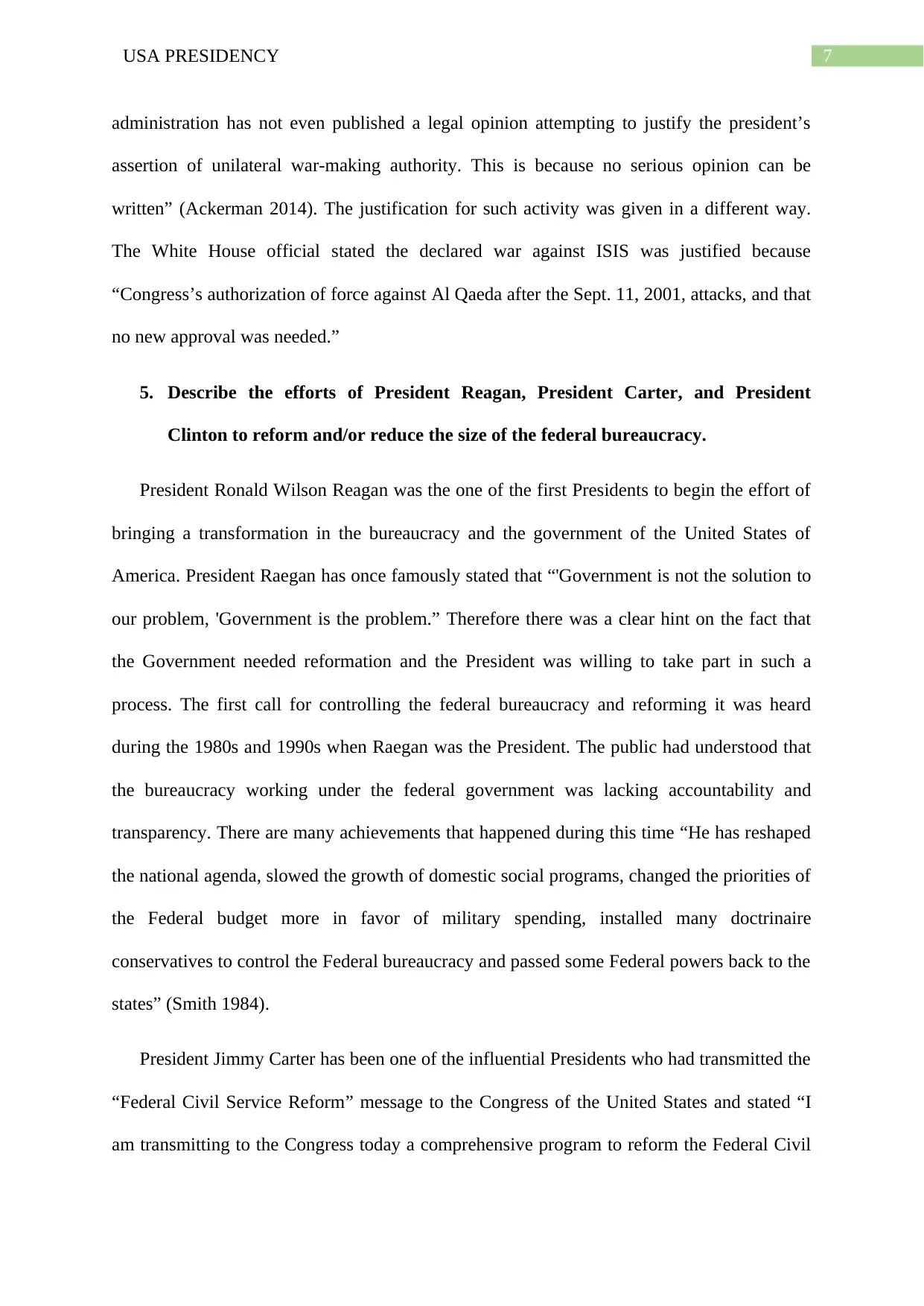
7USA PRESIDENCY
administration has not even published a legal opinion attempting to justify the president’s
assertion of unilateral war-making authority. This is because no serious opinion can be
written” (Ackerman 2014). The justification for such activity was given in a different way.
The White House official stated the declared war against ISIS was justified because
“Congress’s authorization of force against Al Qaeda after the Sept. 11, 2001, attacks, and that
no new approval was needed.”
5. Describe the efforts of President Reagan, President Carter, and President
Clinton to reform and/or reduce the size of the federal bureaucracy.
President Ronald Wilson Reagan was the one of the first Presidents to begin the effort of
bringing a transformation in the bureaucracy and the government of the United States of
America. President Raegan has once famously stated that “'Government is not the solution to
our problem, 'Government is the problem.” Therefore there was a clear hint on the fact that
the Government needed reformation and the President was willing to take part in such a
process. The first call for controlling the federal bureaucracy and reforming it was heard
during the 1980s and 1990s when Raegan was the President. The public had understood that
the bureaucracy working under the federal government was lacking accountability and
transparency. There are many achievements that happened during this time “He has reshaped
the national agenda, slowed the growth of domestic social programs, changed the priorities of
the Federal budget more in favor of military spending, installed many doctrinaire
conservatives to control the Federal bureaucracy and passed some Federal powers back to the
states” (Smith 1984).
President Jimmy Carter has been one of the influential Presidents who had transmitted the
“Federal Civil Service Reform” message to the Congress of the United States and stated “I
am transmitting to the Congress today a comprehensive program to reform the Federal Civil
administration has not even published a legal opinion attempting to justify the president’s
assertion of unilateral war-making authority. This is because no serious opinion can be
written” (Ackerman 2014). The justification for such activity was given in a different way.
The White House official stated the declared war against ISIS was justified because
“Congress’s authorization of force against Al Qaeda after the Sept. 11, 2001, attacks, and that
no new approval was needed.”
5. Describe the efforts of President Reagan, President Carter, and President
Clinton to reform and/or reduce the size of the federal bureaucracy.
President Ronald Wilson Reagan was the one of the first Presidents to begin the effort of
bringing a transformation in the bureaucracy and the government of the United States of
America. President Raegan has once famously stated that “'Government is not the solution to
our problem, 'Government is the problem.” Therefore there was a clear hint on the fact that
the Government needed reformation and the President was willing to take part in such a
process. The first call for controlling the federal bureaucracy and reforming it was heard
during the 1980s and 1990s when Raegan was the President. The public had understood that
the bureaucracy working under the federal government was lacking accountability and
transparency. There are many achievements that happened during this time “He has reshaped
the national agenda, slowed the growth of domestic social programs, changed the priorities of
the Federal budget more in favor of military spending, installed many doctrinaire
conservatives to control the Federal bureaucracy and passed some Federal powers back to the
states” (Smith 1984).
President Jimmy Carter has been one of the influential Presidents who had transmitted the
“Federal Civil Service Reform” message to the Congress of the United States and stated “I
am transmitting to the Congress today a comprehensive program to reform the Federal Civil
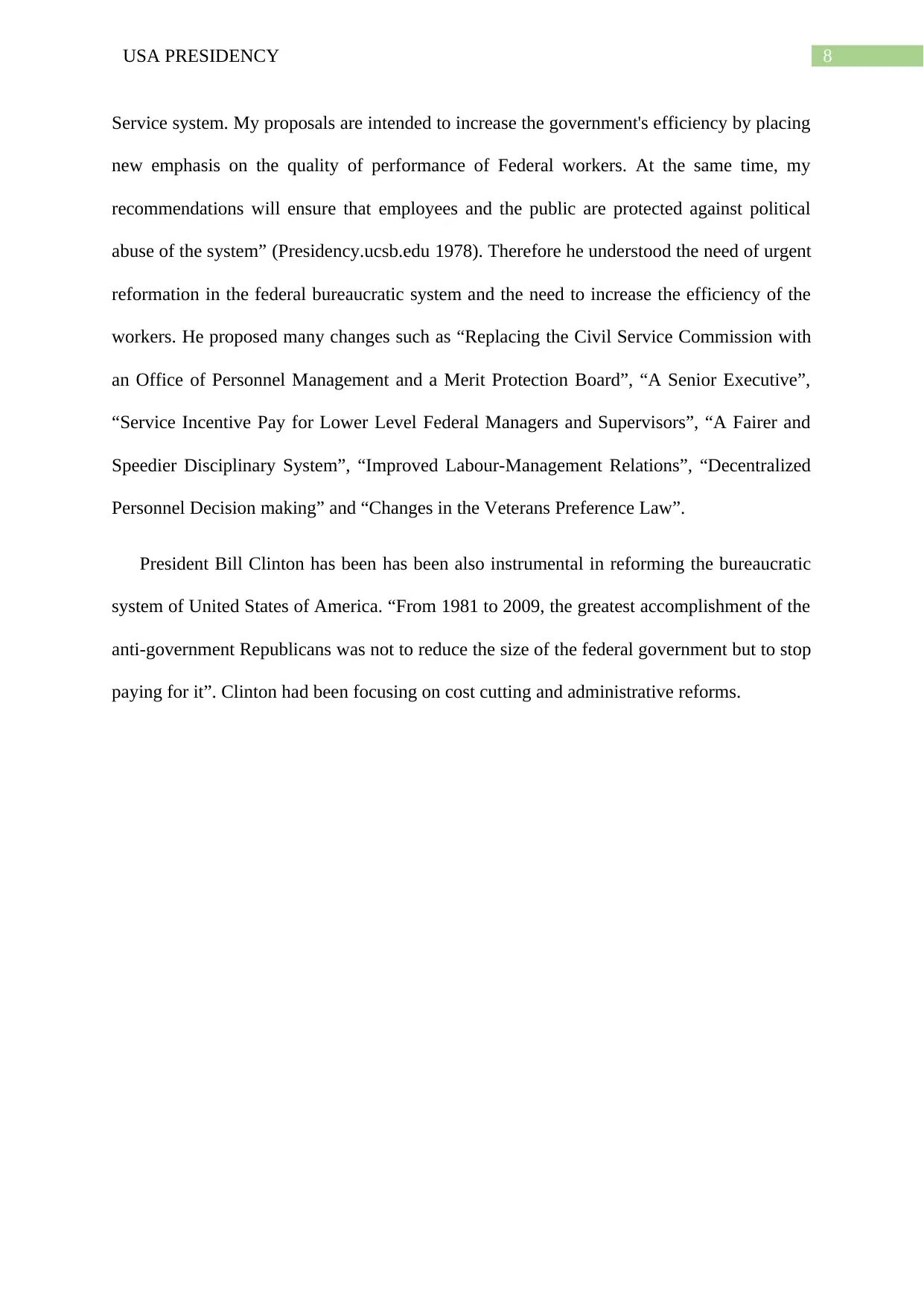
8USA PRESIDENCY
Service system. My proposals are intended to increase the government's efficiency by placing
new emphasis on the quality of performance of Federal workers. At the same time, my
recommendations will ensure that employees and the public are protected against political
abuse of the system” (Presidency.ucsb.edu 1978). Therefore he understood the need of urgent
reformation in the federal bureaucratic system and the need to increase the efficiency of the
workers. He proposed many changes such as “Replacing the Civil Service Commission with
an Office of Personnel Management and a Merit Protection Board”, “A Senior Executive”,
“Service Incentive Pay for Lower Level Federal Managers and Supervisors”, “A Fairer and
Speedier Disciplinary System”, “Improved Labour-Management Relations”, “Decentralized
Personnel Decision making” and “Changes in the Veterans Preference Law”.
President Bill Clinton has been has been also instrumental in reforming the bureaucratic
system of United States of America. “From 1981 to 2009, the greatest accomplishment of the
anti-government Republicans was not to reduce the size of the federal government but to stop
paying for it”. Clinton had been focusing on cost cutting and administrative reforms.
Service system. My proposals are intended to increase the government's efficiency by placing
new emphasis on the quality of performance of Federal workers. At the same time, my
recommendations will ensure that employees and the public are protected against political
abuse of the system” (Presidency.ucsb.edu 1978). Therefore he understood the need of urgent
reformation in the federal bureaucratic system and the need to increase the efficiency of the
workers. He proposed many changes such as “Replacing the Civil Service Commission with
an Office of Personnel Management and a Merit Protection Board”, “A Senior Executive”,
“Service Incentive Pay for Lower Level Federal Managers and Supervisors”, “A Fairer and
Speedier Disciplinary System”, “Improved Labour-Management Relations”, “Decentralized
Personnel Decision making” and “Changes in the Veterans Preference Law”.
President Bill Clinton has been has been also instrumental in reforming the bureaucratic
system of United States of America. “From 1981 to 2009, the greatest accomplishment of the
anti-government Republicans was not to reduce the size of the federal government but to stop
paying for it”. Clinton had been focusing on cost cutting and administrative reforms.
⊘ This is a preview!⊘
Do you want full access?
Subscribe today to unlock all pages.

Trusted by 1+ million students worldwide
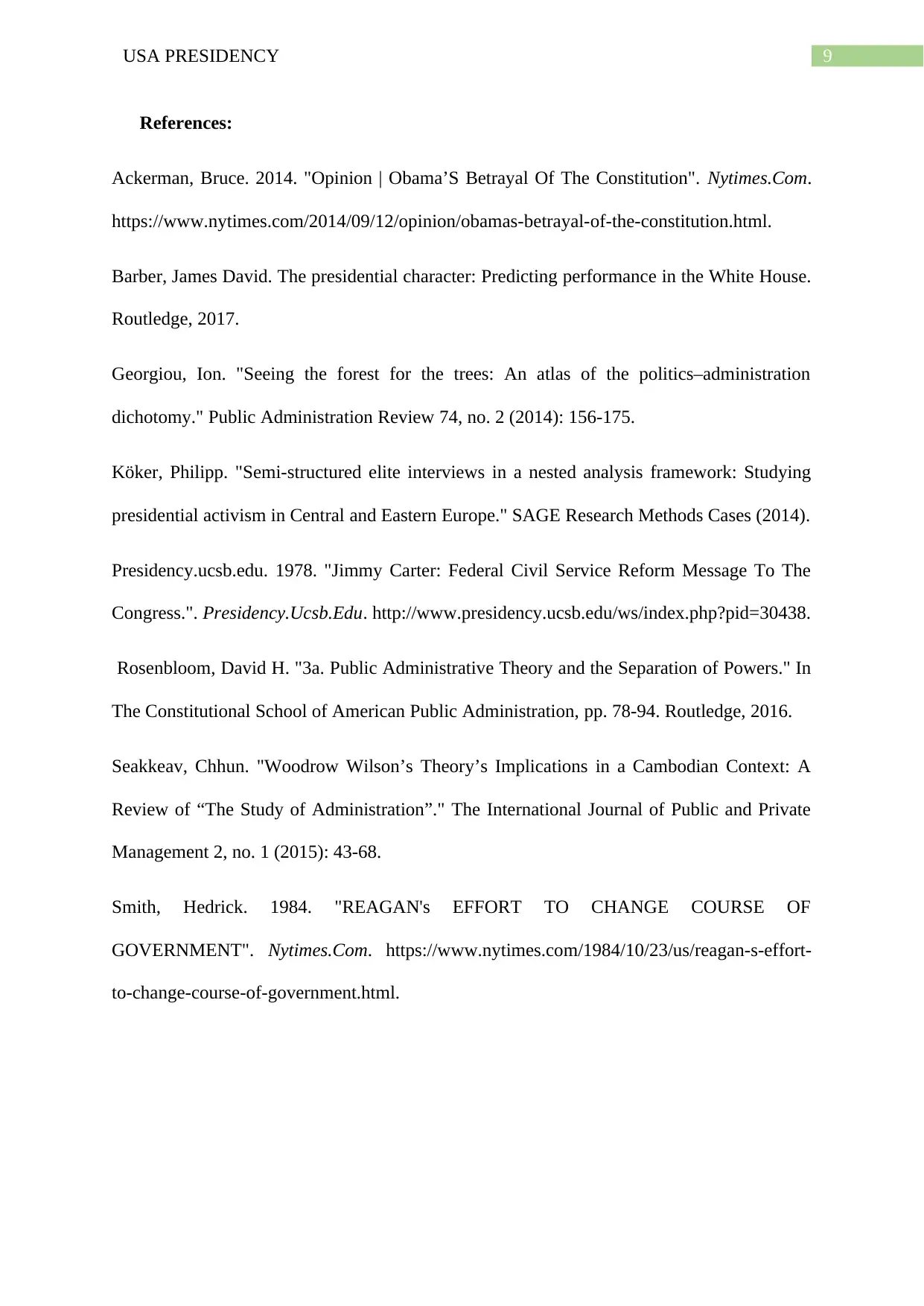
9USA PRESIDENCY
References:
Ackerman, Bruce. 2014. "Opinion | Obama’S Betrayal Of The Constitution". Nytimes.Com.
https://www.nytimes.com/2014/09/12/opinion/obamas-betrayal-of-the-constitution.html.
Barber, James David. The presidential character: Predicting performance in the White House.
Routledge, 2017.
Georgiou, Ion. "Seeing the forest for the trees: An atlas of the politics–administration
dichotomy." Public Administration Review 74, no. 2 (2014): 156-175.
Köker, Philipp. "Semi-structured elite interviews in a nested analysis framework: Studying
presidential activism in Central and Eastern Europe." SAGE Research Methods Cases (2014).
Presidency.ucsb.edu. 1978. "Jimmy Carter: Federal Civil Service Reform Message To The
Congress.". Presidency.Ucsb.Edu. http://www.presidency.ucsb.edu/ws/index.php?pid=30438.
Rosenbloom, David H. "3a. Public Administrative Theory and the Separation of Powers." In
The Constitutional School of American Public Administration, pp. 78-94. Routledge, 2016.
Seakkeav, Chhun. "Woodrow Wilson’s Theory’s Implications in a Cambodian Context: A
Review of “The Study of Administration”." The International Journal of Public and Private
Management 2, no. 1 (2015): 43-68.
Smith, Hedrick. 1984. "REAGAN's EFFORT TO CHANGE COURSE OF
GOVERNMENT". Nytimes.Com. https://www.nytimes.com/1984/10/23/us/reagan-s-effort-
to-change-course-of-government.html.
References:
Ackerman, Bruce. 2014. "Opinion | Obama’S Betrayal Of The Constitution". Nytimes.Com.
https://www.nytimes.com/2014/09/12/opinion/obamas-betrayal-of-the-constitution.html.
Barber, James David. The presidential character: Predicting performance in the White House.
Routledge, 2017.
Georgiou, Ion. "Seeing the forest for the trees: An atlas of the politics–administration
dichotomy." Public Administration Review 74, no. 2 (2014): 156-175.
Köker, Philipp. "Semi-structured elite interviews in a nested analysis framework: Studying
presidential activism in Central and Eastern Europe." SAGE Research Methods Cases (2014).
Presidency.ucsb.edu. 1978. "Jimmy Carter: Federal Civil Service Reform Message To The
Congress.". Presidency.Ucsb.Edu. http://www.presidency.ucsb.edu/ws/index.php?pid=30438.
Rosenbloom, David H. "3a. Public Administrative Theory and the Separation of Powers." In
The Constitutional School of American Public Administration, pp. 78-94. Routledge, 2016.
Seakkeav, Chhun. "Woodrow Wilson’s Theory’s Implications in a Cambodian Context: A
Review of “The Study of Administration”." The International Journal of Public and Private
Management 2, no. 1 (2015): 43-68.
Smith, Hedrick. 1984. "REAGAN's EFFORT TO CHANGE COURSE OF
GOVERNMENT". Nytimes.Com. https://www.nytimes.com/1984/10/23/us/reagan-s-effort-
to-change-course-of-government.html.
1 out of 10
Related Documents
Your All-in-One AI-Powered Toolkit for Academic Success.
+13062052269
info@desklib.com
Available 24*7 on WhatsApp / Email
![[object Object]](/_next/static/media/star-bottom.7253800d.svg)
Unlock your academic potential
Copyright © 2020–2026 A2Z Services. All Rights Reserved. Developed and managed by ZUCOL.





